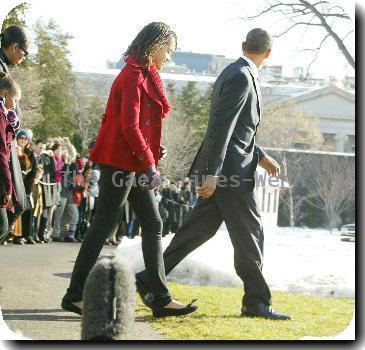Indiana’s Evan Bayh announces he will retire from Senate, continuing recent trend
By Alan Fram, APMonday, February 15, 2010
Democrat Evan Bayh of Ind. to retire from Senate
WASHINGTON — Sen. Evan Bayh, a centrist Democrat from Indiana, announced Monday that he won’t seek a third term in Congress, giving Republicans a chance to pick up a Senate seat.
“To put it in words I think most people can understand: I love working for the people of Indiana, I love helping our citizens make the most of their lives, but I do not love Congress,” Bayh said at a news conference Indianapolis, where he was joined by his wife and two sons.
The departure of Bayh, who was on President Barack Obama’s short list of vice presidential candidate prospects in 2008, continues a recent exodus from Congress among both Democrats and Republicans, including veteran Democrats Christopher Dodd of Connecticut and Patrick Kennedy of Rhode Island.
The announcements have sprung up in rapid-fire fashion amid polls showing a rising anti-incumbent fervor and voter anger over Washington partisanship, high unemployment, federal deficits and lucrative banking industry bonuses.
Obama thanked Bayh for his years of public service.
“During that time, he has fought tirelessly for Indiana’s working families, reaching across the aisle on issues ranging from job creation and economic growth to fiscal responsibility and national security,” Obama said in a written statement. “I look forward to continuing to work with him on these critical challenges throughout the rest of the year.”
Bayh, who won the seat to the Senate in 1998, attributed his decision to the bitter partisan divides that have dominated Congress in recent years, though he praised his colleagues as hard workers devoting to serving the public.
“My decision should not be interpreted for more than it is, a very difficult, deeply personal one,” he said. “I am an executive at heart. I value my independence. I am not motivated by strident partisanship or ideology.”
Bayh, 54, said he believed he would have been re-elected this November, despite “the current challenging environment.” He said it was time for him to “contribute to society in another way,” either by creating jobs with a business, leading a college or university, or running a charity.
His retirement from a Senate seat from Republican-leaning Indiana also adds to the struggle Democrats will face this fall to prevent an erosion of the 59 votes they have in the chamber.
“After all these years, my passion for service to our fellow citizens is undiminished, but my desire to do so by serving in Congress has waned,” Bayh said at the news conference.
The Democrats will have to scramble to find a replacement candidate for Bayh’s seat. Friday is the filing deadline for the May primary, although the party would have until June 30 to select a replacement candidate.
Bayh declined to say whether he would back anyone as his replacement but said he would support whoever was the Democratic nominee.
State Democratic Chairman Dan Parker, who was Bayh’s campaign manager, said he learned of Bayh’s decision over the weekend and also declined to discuss possible candidates.
Bayh’s name was among a handful of well-known Democrats prominently mentioned as possible vice presidential candidates in both Sen. John Kerry’s 2004 run for the presidency and Obama’s successful run for the White House. He was believed to have been on Obama’s short list. Obama settled on then-Sen. Joseph Biden of Delaware.
Less than two weeks ago, former Indiana Sen. Dan Coats, a Republican, announced that he would try to reclaim his old seat from Bayh. The move by Coats came as the GOP was still celebrating Republican Scott Brown’s January upset to take Edward Kennedy’s former seat in Massachusetts.
Indiana Republican Chairman Murray Clark said he had high hopes his party would win Bayh’s seat even before the senator’s announcement. He said Bayh’s votes in favor of the federal stimulus package and the Senate’s health care overhaul bill had damaged his moderate image and his re-election prospects.
“When this president was elected, he was forced to cast votes in a way that were inconsistent with mainstream Hoosiers’ beliefs,” Clark said. “Unfortunately, his voting countered the reasons for his prior success.”
North Dakota’s Democratic Sen. Byron Dorgan also is retiring, and his party doesn’t have anyone to challenge the Republican, Gov. John Hoeven. Democrats also failed to recruit their top candidate in Delaware. Biden’s son, Beau Biden, eschewed a run against Republican Mike Castle.
Bayh is serving his second six-year term in the Senate, and is a centrist Democrat from a Republican-leaning state.
Bayh served two terms as Indiana’s governor before winning the first of his two Senate terms in 1998. He had until recent weeks been regarded as a near certainty for re-election, having raised nearly $13 million for his campaign and facing little-known Republican opposition until national Republicans recruited Coats to enter the race.
Bayh’s name was already well known when he first ran for political office in 1986, winning the race for Indiana secretary of state that year. His father, Birch, won the first of three terms in the U.S. Senate in 1962 and was an unabashed Great Society liberal.
The younger Bayh ran for governor in 1988 on a platform of fiscal responsibility, reducing what he considered to be a bloated government bureaucracy and opposing tax increases.
Bayh served two terms as Indiana’s governor before winning the first of his two Senate terms in 1998.
Associated Press writers Ken Kusmer and Tom Davies in Indianapolis contributed to this story.
Tags: Barack Obama, Campaigns, Edward Kennedy, Evan bayh, Geography, Health Care Reform, Indiana, Indianapolis, John Kerry, North America, Political Issues, Political Organizations, Political Parties, United States, Washington

